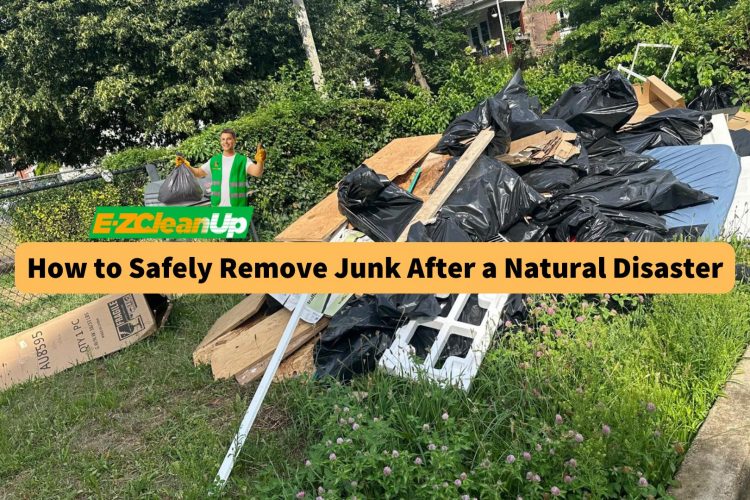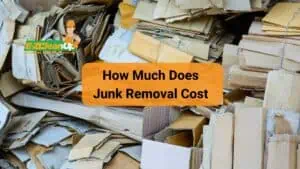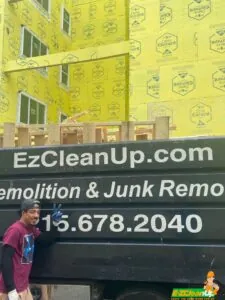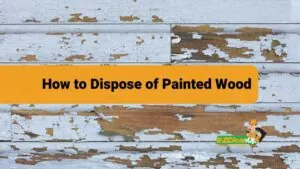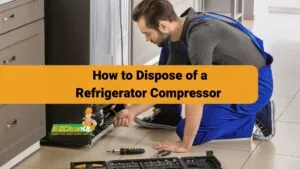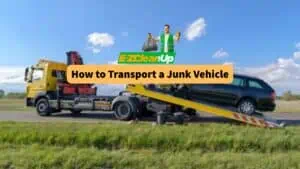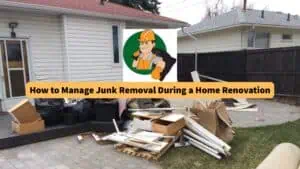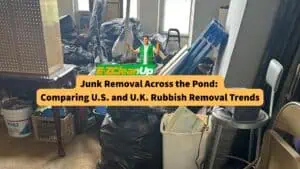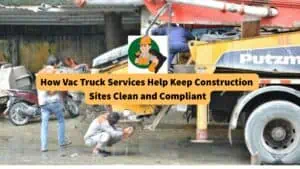Removing junk after a natural disaster usually involves evaluating the damage, the use of protective gear, and handling hazardous materials carefully. For a successful and safe cleanup, consider hiring a professional junk removal service to manage debris, minimize health risks, and restore your property.
To learn more about how to safely remove junk after a natural disaster, you can use this article as a guide to reclaim once an unpreventable event strikes your home.
#1 Why Junk Removal Companies Are Important After Natural Disasters
Junk removal companies play a vital role in the aftermath of natural disasters by simplifying debris clearance, securing safety, and facilitating recovery efforts.
They help restore normalcy by removing hazardous materials that pose risks to residents and emergency responders.
Their expertise also enables efficient coordination with local authorities and compliance with environmental regulations. These factors make them an essential part of effective disaster response.
#2 The Junk Removal Process
Junk removal services play an important role in the aftermath of natural disasters like hurricanes, floods, and fires. These events leave behind significant debris and hazards that can pose safety risks and obstruct recovery efforts.
For a thorough cleanup, here’s a look at each key step involved.
Initial Assessment
First, they start by inspecting the area for damage and hazards. They also identify debris types like hazardous materials or unstable structures and check for safety risks, such as downed power lines.
Planning and Prioritization
Second, they create a cleanup plan that focuses on the most urgent and unsafe areas. Setting a timeline and coordinating with local authorities is also their priority to provide safe disposal practices.
Clearing Debris
They also use equipment like trucks and loaders to remove debris safely. During the process, they make sure that all workers wear protective gear and follow safety guidelines to protect themselves and others.
Sorting and Categorizing Debris
These companies also organize debris into types—vegetation, construction waste, and hazardous items. By separating recyclables, they can handle any hazardous waste carefully to prevent contamination.
Disposal and Recycling
Junk removal companies can also transport debris to approved disposal sites or recycling centers that follow local rules. They also donate usable items where possible to support the community.
Monitoring and Follow-Up
They do a final check to make sure that the cleanup is complete. You can also notify them of any leftover issues, while they gather feedback from residents to improve future cleanup efforts.
#3 Challenges in Junk Removal
Junk removal companies are amazing services to tap into during natural disasters. However, they can also face several challenges when cleaning, which can complicate the process:
1. Labor Shortages
Finding reliable workers is tough during recovery efforts. Many companies struggle to recruit enough people willing to do physically demanding and risky work, which can slow down the cleanup.
2. Communication with Local Authorities
Clear communication with local governments is necessary. Yet, misunderstandings about waste disposal rules can confuse residents about proper debris disposal.
3. Volume of Debris
Disasters produce vast amounts of debris that can overwhelm local waste management systems. For example, Hurricane Harvey generated an estimated 200 to 300 million cubic yards of waste in Texas.
4. Hazardous Materials
Disasters can leave dangerous materials like contaminated water and toxic debris. Proper handling and disposal are vital to protect the health of workers and residents.
5. Safety Risks
Hazardous debris also poses safety risks for workers and residents. Improper handling can result in injuries or exposure to harmful substances.
6. Environmental Concerns
Accumulated debris can block waterways and increase flood risks.
7. Regulatory Compliance
Navigating local laws regarding debris removal can be complex, especially for hazardous materials. Companies must comply to avoid legal issues while managing waste.
8. Community Engagement
Residents may attempt to handle cleanup themselves, which can lead to inconsistent removal efforts and safety hazards–if untrained individuals manage hazardous materials.
#4 FEMA Assistance for Homeowners and Renters
FEMA’s support is vital for recovery, as they provide financial aid for housing, repairs, and other essential needs. These can help communities rebuild their lives after disasters.
Here’s a summary of the types of assistance available:
- Rental Assistance – Helps cover temporary housing costs–including rent, security deposits, and essential utilities.
- Home Repair Assistance – Provides financial aid for repairing damage to primary residences, to guarantee that homes are safe and livable.
- Lodging Expense Reimbursement – Reimburses costs for temporary lodging if a home is unlivable due to disaster damage.
- Other Needs Assistance – Covers essential needs not addressed by insurance, such as personal property losses, medical expenses, and necessary household items.
Eligibility and Application
Homeowners and renters can apply for assistance even if they have insurance, as long as they provide documentation of denied claims. Applications can be made online, via the FEMA Helpline, or at Disaster Recovery Centers.
In addition, you can also find FEMA temporary disaster relief jobs on Jooble.
#5 FAQs
How can communities achieve efficient junk removal and recovery after a disaster?
Communities can do this by coordinating with local authorities, engaging with experienced junk removal companies, and providing clear communication to residents about disposal procedures.
What should I do if I encounter hazardous materials during the clean-up?
It’s important to avoid touching or handling hazardous materials. Instead, contact a professional junk removal service that is trained to handle such waste safely.
Can I apply for FEMA assistance if I have insurance?
Yes, you can apply for FEMA assistance even if you have insurance, as long as you document any denied claims or uncovered expenses.
How quickly should I remove debris after a natural disaster?
It’s best to start removing debris as soon as it’s safe to do so. Prompt removal helps prevent further damage, reduces safety risks, and allows for quicker recovery. Always assess the area for hazards before beginning cleanup and consider hiring professionals if necessary.
#6 The Bottom Line – Junk Removal and Recovery After Natural Disasters
After a natural disaster, removing debris and recovering can be very tough for affected communities. Junk removal services are here to safely clear away dangerous materials and help people get back to normal quickly.
Along with FEMA assistance–which supports homeowners and renters–these services help people rebuild their lives. By knowing the recovery steps and using available help, communities can manage the recovery process better and grow stronger after facing inevitable challenges.

